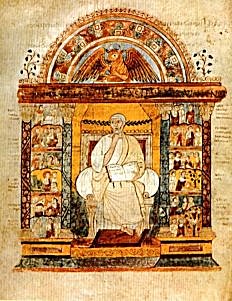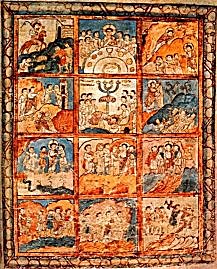|
On March 21st 2013 Justin
Welby was enthroned
as the 104th Archbishop of Canterbury. The first archbishop, Saint
Augustine, arrived in Canterbury in 597, bringing with him a book of the
gospels in Latin. The book still exists, and played its part in the
enthronement. It is the oldest book in Britain, and the oldest
illustrated vulgate in existence. It is now in the library of Corpus
Christi College Cambridge.
Sadly, many of the
illuminated pages have disappeared. Two remain, as shown below.
The first is an introductory page to the Gospel
of Luke. Apart from Luke himself, wondering what to write next, and his
winged ox, there are two side panels illustrating a range of incidents
described in the gospel. Fascinatingly, many of the events depicted are rarely if ever
found elsewhere in art, and the identification of some scenes is
disputed. A helpful 7th or 8th century scribe added notes in the margin,
but modern scholars think he got many of these wrong.
The second page raises fewer problems. It shows the Passion in
twelve scenes, beginning at the entry into Jerusalem and ending rather
abruptly on the way to Calvary - the crucifixion is not shown.
This was still a sensitive issue in 6th century Christianity. It
has been suggested that it might have been based on now-lost frescos in
Rome, where the book was almost certainly created. There are certainly
similarities with catacomb art from two centuries or more before, and I
have included some of these.
Why choose this for a topic? For partly nostalgic
reasons. I lived in Canterbury in the late sixties and seventies, both
as a student and a teacher. The then Archbishop, Michael Ramsey, was a
familiar figure around the town. Saint Augustine's Abbey, the
burial place of Augustine, was next door to my college, and was,
allegedly, haunted by phantom monks. Sadly, our one night-time
ghost-hunting exploit did not produce any monks - they wisely kept well
out of the way when a gang of slightly tipsy students turned up to look
for them.
Click on the images below to explore the pages in detail. |

